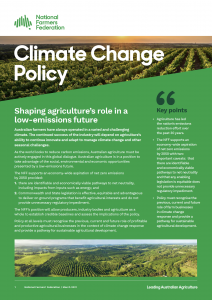The National Farmers’ Federation is helping shape agriculture’s role in a low-emissions future.
Climate change will play a major role in Australian agriculture’s next decade, exacerbating climate risk while creating diverse new income opportunities.
Our Climate Policy
The National Farmers Federation (NFF) supports an economy-wide aspiration of net zero emissions by 2050 provided:
- there are identifiable and economically viable pathways to net neutrality, including impacts from inputs such as energy; and
- Commonwealth and State legislation is effective, equitable and helps deliver on-ground programs that benefit agricultural interests and do not create unnecessary regulatory impediments.
The NFF’s position is designed to allow producers, industry bodies and agriculture as a whole to establish credible baselines and continually assess the implications of policy interventions.
A transition to a low emissions economy will require transformation across a number of complementary sectors, especially electricity and transport. Policy adjustment and investment in research and development will be crucial to meet this task.
Policies that address climate change must be examined to minimise the risk of perverse outcomes and to deliver equitable outcomes for Australian farmers. Governments and industry service providers must have the tools, systems and knowledge required to establish an industry baseline, and be able to communicate this to farm businesses.
To view our Climate Change Policy in full, click here.
Watch the Agriculture and Climate Resilience webinar here.
Key Policy Outcomes
As we engage in the current policy environment, the National Farmers’ Federation is seeking the following key outcomes for its Members:
What is industry doing?
The NFF remains closely engaged with a comprehensive range of existing and new policy and investment frameworks being delivered by the Commonwealth.
The farm sector continues to co-invest in better research and development to meet farmers’ need for information, and deliver new tools and technologies aimed at lowering emissions.
Some key actions from industry include:
- Investment to establish credible baselines and assess the implications of the policy.
- Investment to coordinate climate change investment through the Climate Initiative.
- Collaboration across industry to make the greatest gains from the adoption of the latest research and development.
- Supporting RD&E to invest in technologies that can reduce emissions, improve resilience and adaptation.
Frameworks and targets by commodity sector
Learn more about how each commodity sector is responding to sustainability challenges using the links below.
CO2-e – is the ‘carbon dioxide equivalent’, the standard unit for measuring greenhouse gas impacts. This expresses the impact of another greenhouse gas in terms of the amount of CO2 that would be produced. See a full glossary here.
Net Zero emissions – an overall balance between all greenhouse gas emissions produced and emissions removed from the atmosphere.
Carbon Neutral – Similar to net zero emissions but focuses only on CO2.
Further reading
Please see a fact sheet on the Climate Change Bill 2022 and Climate Change (Consequential Amendments) Bill 2022 here.
For recent submissions related to Climate Change, click here.
To read more about the NFF’s Climate Change Policy, click the image below:





Add comment